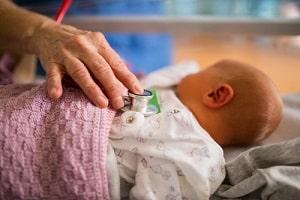Chicago, IL 60601
FREE CONSULTATIONS 312-462-4200
TOLL FREE 833-462-4200
What Is Sepsis, and How Can it Affect a Mother or Child During Birth?

During pregnancy, labor, and delivery, there are a variety of health issues that can affect both mothers and children. One major concern is the possibility of contracting infectious diseases. Viruses or bacteria may be transferred from a mother to a child during pregnancy, or pediatric infections or maternal infections may occur if the proper sterilization procedures are not followed during delivery. While infections can be dangerous enough on their own, they may also result in sepsis, which is a life-threatening condition that can affect a person’s long-term health.
Symptoms and Complications of Sepsis
In some cases, infections are localized in one part of the body. However, when an infection spreads throughout the body or bloodstream, or if it infects one or more major organs, this may trigger an immune response that can cause additional complications. The chemicals released by the body to combat infections can lead to the inflammation of the body’s tissues. In serious cases, a person may experience septic shock, in which their blood pressure may drop to dangerously low levels, and they may suffer permanent damage to organs such as the heart, lungs, kidneys, or brain.
Symptoms of sepsis for mothers may include either a high fever or a low body temperature, as well as elevated heart rate and breathing, fatigue, nausea, decreased urination, sweating, and discolored patches of skin. In addition to these symptoms, signs that indicate that a newborn is experiencing sepsis include poor circulation in the extremities, swelling in the abdomen, listlessness, difficulty breastfeeding, seizures, jaundice, and breathing that stops temporarily. Doctors may confirm a sepsis diagnosis by taking samples of blood or urine and performing other tests to determine whether an infection occurred and identify problems with blood clotting, electrolyte imbalances, decreased oxygen levels, or abnormal function of the liver or kidneys.
Treatment for sepsis will usually involve administering antibiotics to combat infections, as well as other medications to help increase blood pressure, maintain the proper blood sugar levels, and reduce inflammation. If necessary, a respirator may be used to ensure that a patient can receive the proper amount of oxygen. If the kidneys have been affected, dialysis may need to be performed. In some cases, surgery may be performed to remove infected tissue from the body.
Contact Our Cook County Sepsis Injury Attorneys
Sepsis is one of the most serious issues that can affect patients, and medical personnel should be sure to recognize the signs and symptoms of this condition during and after labor and delivery. If the proper treatment is not provided, a mother or child who experiences sepsis may suffer permanent bodily harm or death. If sepsis has affected you or your child, the Birth Injury Law Alliance can help you understand your best options for receiving financial assistance that will allow you to receive the ongoing treatment you need. We will review your case to determine whether medical negligence occurred, and we will advise you of how you can receive financial compensation for the harm you have suffered. Contact our Chicago birth injury lawyers and set up a free consultation by calling 312-462-4200 today.
Sources:
https://www.mayoclinic.org/diseases-conditions/sepsis/symptoms-causes/syc-20351214
https://www.healthline.com/health/sepsis
https://www.webmd.com/a-to-z-guides/sepsis-septicemia-blood-infection





